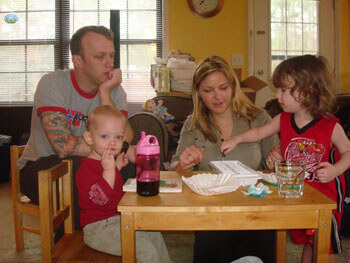Conflicting Parenting Styles – Is It Affecting Your Family?
Just because you love each other doesn’t mean you love your spouse’s approach to raising kids.
Why do conflicting parenting styles happen? Most often, despite all the books we read about parenting, we tend to rely on how we ourselves were raised. We attempt to build on what worked, and reshape what didn’t.
The different parenting styles – which one is yours?
Psychologists refer to parenting styles as either authoritarian, permissive, uninvolved, or authoritative.
Are you a drill-sergeant? Do you control the kids’ every move? Your kids are a reflection of you. You decide what clothes they wear each day and how they pour their milk. This is authoritarian parenting.
Are you a bit of an absent sort? Do you let others make all the decisions? You may be with the kids physically, but your mind is often elsewhere. This is uninvolved parenting.
Are you an ‘anything goes’ mum or dad? Do you say “Yes!” to everything they ask for? You want your children to be happy and you want them to like you — even if it means they skip the veggies and have seconds of pudding. This is permissive parenting.
Are you a good pack leader? Do you try to understand why your kids acted the way they did, and respect their feelings? If they broke a glass by accident when they were trying to clear the table, you show them how to do it safely next time and discuss a way to make amends for the damage. This is authoritative parenting.
What Effects are Different Parenting Styles Having on Your Children?
Prolonged differences in parenting approaches can lead to the following issues in your children:

By: Natesh Ramasamy
Anxiety. When caregivers argue or express extreme emotions in front of their kids, children can feel their world is collapsing — their safety net has holes. And even if you keep the verbal sparring away from the kids, children seem to have a radar that senses your emotional state.
Insecurity. Kids thrive in the present moment, and feel safest with a consistent rhythm to the day. When caregivers react wildly or unpredictably, children can become stressed, depressed or angry.
Guilt or Shame. Kids see the world with themselves at the very centre. Even if the fighting wasn’t about them, children often feel like they are to blame for their parents’ arguments.
Acting out. Kids might yell and fight – simply copying what they see their parents doing. Or, they may not know how to handle their insecurity, guilt, depression, or anger and may start becoming aggressive, defiant, stubborn, sneaky, whiny, clingy, etc.
So what parenting style is best, then?
Research carried out at the University of North Carolina found that the best parenting style, Authoritative, leads to the most responsible, self-directed kids.
Even if only one of the parents regularly employed this balanced parenting approach, the negative effects of the other forms of parenting were found to be minimised.
So to be a “good” parent, you want to reach a happy middle ground between “Anything-Goes” and “Drill-Sergeant” parenting. But finding the middle for yourself is one thing. Finding it as a couple is quite a different story.
How to Parent as More of a Team
1.Develop a unified view of your life goals for your family.
Do you both want well-behaved kids who grow into their own unique person? To have respectful relationships as a family? Or have a family with a deep spiritual foundation? These things need careful discussion and to be committed to.
2. Clearly validate the things you agree on.
Once you know your overall life plan for your family, then be concise about what you agree is going to be your daily parenting routine. Do you want your kids to be active in life over always in front of a computer? What will consistent bed time rituals be? What language is permissible around your children, what kind of diet do you want to feed them?
Don’t convince yourself small day-to-day things don’t matter – such things also need proper discussion and decisions or little things can roll into big arguments.
3. Work to fully understand differences between you.
It is important to attempt to not just recognise the differences, but to put real effort into understanding each others reasons for having differences. What was your partner’s childhood like? How did they become who they are?
Don’t get stuck in a rut when it comes to communication or use the old excuse ‘this is just the way we are with each other’ – better communication is the answer to a happier family environment.
Take time to learn how to communicate under stress. This means working to avoid judgements and assumptions, taking responsibility for how you feel, and trying to avoid blame and blaming language such as ‘you did this, you did that’. Instead, work with a format such as “I felt _____ when I heard or saw _____, because I need ______.”
4. Develop an acceptable compromise.
Keep communicating until you are definitely in an agreement of some sort. If it’s helpful, write down together what is agreed on so later you can’t quarrel over what it was or create nuances that simply were not part of the agreement.
5. Express appreciation.
Mistakes will happen. We are only human, after all. But go easy on yourself and your family. Find specific things to be grateful for (both in yourself and in others). And remember to share your appreciation with your partner. For example, “I really liked when you sang that silly song to the kids. I was getting so frustrated and hungry because we were late for dinner and needed something that lifted my spirits like that silly song. Thank you.”.
What about things you just can’t find a compromise on?
Some issues can see you unable to find a middle ground as they are sensitive, or perhaps as they evoke difficult childhood memories for one or both of you.
Sometimes you might need to agree to disagree. But for your relationship to not experience damage, it’s important that you can then see each others good intentions despite the difference.
An example of such an issue would be spanking. Perhaps your partner believes in it and you find it a horrifying concept. But you do see that her intent is that she wants her children to grow up into good people – to understand wrong behaviour and learn and grow. Do still work for a compromise. Perhaps, for example, she can always ask you to take over if she feels it’s time for a spanking, and if you are not home agrees to splash cool water on her face, count to ten, and think of three loving thoughts before giving any sort of punishment.
If you fail to see the positive intention of your partner and are suffering anxiety over it, or if you worry your partner is doing real damage to your children in any way, it is of course recommended to seek help.
When is it time to seek professional support for conflicting parenting styles?
If there is a real problem with one partner, such as a tendency to over punish in a way that does not merit the child’s apparent misdemeanour, or if your fights with your spouse are more common than your good times, then evidently it is very helpful to seek exterior advice from a mental health professional.
It’s also a great idea to consider family counselling or couples counselling any time you feel your relationship could use an assessment. A therapist will not tell you how to parent, but they will help you learn to communicate with each other so you can mutually come to your own best decisions.
Do you have a tip for parenting together when you have different styles? Share below.







Hi,This article is so useful for me about parenting styles
good job and thank you!!!
Glad it was useful. We have removed the link you embedded as we don’t allow advertising.
Nice post. Well explained.